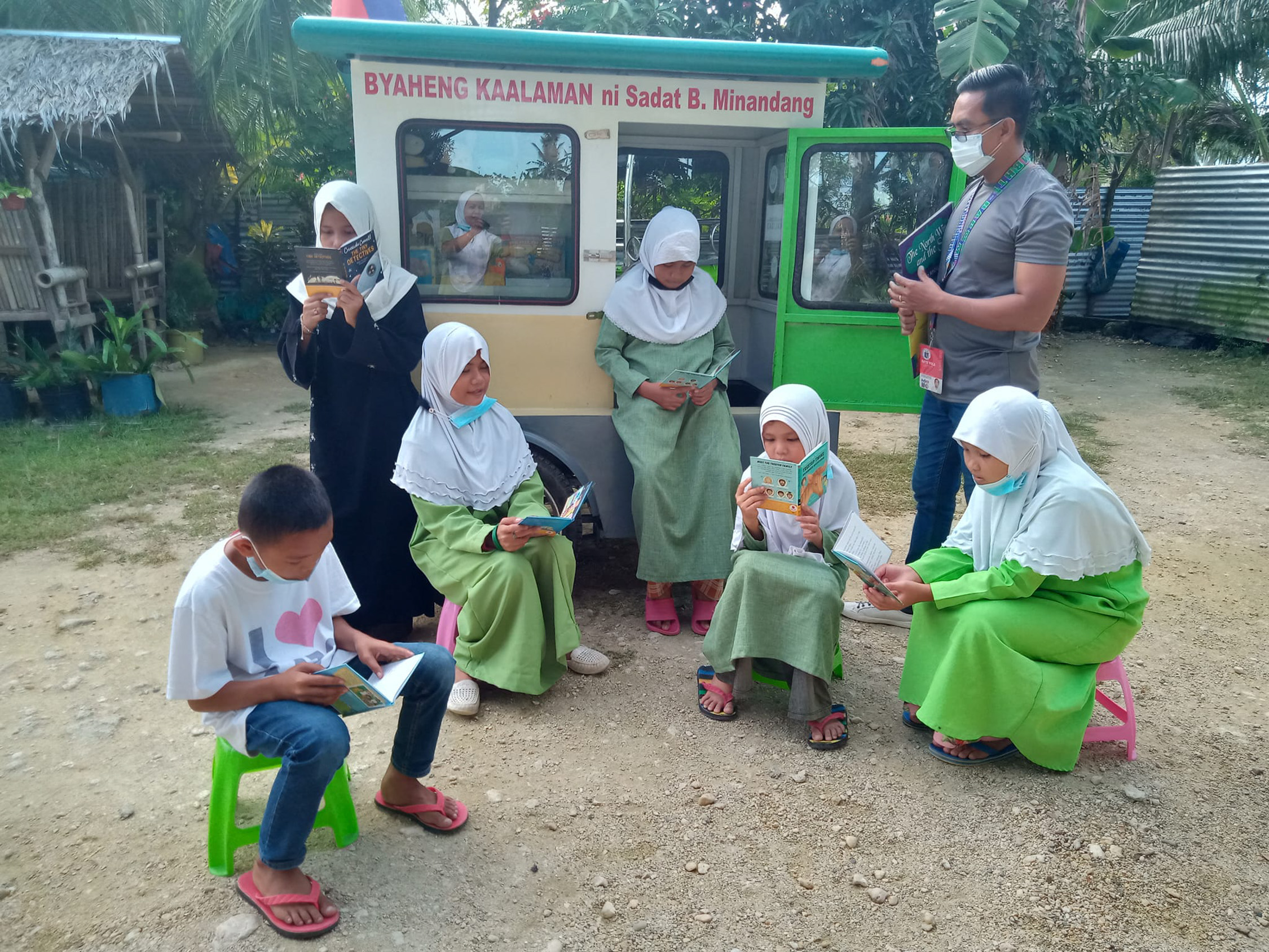
LEARNING ON THE MOVE Sadat Minandang (standing, right) did not abandon his “Byaheng Kaalaman” project despite his added responsibilities as a school principal in Cotabato City. It earned him high praise from the Thailand-based Princess Maha Chakri Award Foundation in 2019. —BYAHENG KAALAMAN FACEBOOK PAGE
After Sadat Minandang won a prestigious award for his invaluable contributions to education, one might expect him to already rest on his laurels.
But for Minandang, whose earlier community service seemed to have prepared him for his current responsibilities as a school principal, the journey is far from over. As he himself put, it is a “lifelong commitment.”
Before joining the ranks of public school teachers in 2013, Minandang was with a nongovernmental organization that helped internally displaced children in conflict areas. He was particularly involved in programs providing psychosocial support and interventions.
“My work as a humanitarian in the community was what I brought to the DepEd (Department of Education),” Minandang said in an interview.
Even after getting promoted from Teacher 1 to Master Teacher, and now serving as principal of a last-mile school in Cotabato City, Minandang did not abandon his award-winning project “Byaheng Kaalaman.”
It was his version of the widely praised “Kariton Klasrum” initiative of Efren Peñaflorida in the late 2000s that brought a mobile classroom of sorts—literally a pushcart loaded with books and other educational materials—to neighborhoods where the families are too poor to enroll or keep children in school.
In “Kaalaman,” Minandang also takes a cart to reach such children. And behind this hardware, so to speak, is an outline he drew up with four main components: basic literacy and numeracy, sanitation and hygiene, children’s rights and—moving from honing the mind to nourishing the body—a feeding program.
Accolade from Thailand
In 2019, the Thailand-based Princess Maha Chakri Award (PMCA) Foundation named Minandang one of the Outstanding Teachers in Southeast Asia for his significant impact on the lives of his students, especially the displaced minors in the strife-torn areas of the Bangsamoro region.
Four years later, as part of PMCA Foundation’s mission to the Philippines earlier this month, Minandang, along with two other Filipino teacher-awardees, was given an opportunity to seek the support of the Thai business community for his project. Their interaction was arranged by the Royal Thai Embassy in Manila.
READ: Thailand and PH: A tale of two countries
“What’s unique is what happens after the award. As we’ve been telling each other, PMCA is like a lifetime commitment … you need to produce more outstanding initiatives,” he said.
“The PMCA has changed not only our lives but also the lives of those we are helping. In fact, the ‘pioneers’ of Byaheng Kaalaman are now in Grade 5,” Minandang added.
Culture-based
For Jesus Insilada, a public school district supervisor in Iloilo and a 2017 recipient of the PMCA, the development of their advocacy projects may be considered “organic’’ or shaped by realities peculiar to their locality.
As part of the Panay-Bukidnon indigenous community, Insilada worked on the promotion of culture-based education even before such a concept was made a permanent feature of the DepEd curriculum.
“I added different flavors depending on what’s enticing. For example, I’m into creative arts and creative writing so I integrated that into the curriculum,” he explained.
“Just recently, I introduced filmmaking to integrate different aspects of culture into the curriculum. It becomes engaging not only to the learners but also to the school and the wider community,” he said.
The PMCA is an international award established in 2014 in honor of Thai Princess Maha Chakri Sirindhorn for her work in education over the last four decades.
Asean honorees
The award is given every two years to the exemplary teachers in each of the 11 member countries of the Association of Southeast Asian Nations (Asean), including Timor-Leste. The teachers are nominated by their respective education ministries.
According to the foundation, the honorees are provided with opportunities to improve the best practices that had earned them the award, pursue further professional development and learn from peers in the Asean community through study visits and workshops.
PMCA Foundation chair Dr. Krissanapong Kirtikara, who was in the Philippines from March 9 to March 15, met with Jerwin Valencia, the 2023 awardee from Dingras National High School in Ilocos Norte. Accompanying the visiting delegation was Thai Ambassador Tull Traisorat and DepEd representatives.
In an interview with the Inquirer last year, Valencia said the children in his class were his source of inspiration. “Every time I see them on the streets, they say ‘Sir, take care!’” he recalled.
‘Project MATH’
Among Valencia’s initiatives is “Project MATH (Make A Tremendous Help),” which teaches mathematics and related concepts using examples or situations that children encounter in their daily lives.
Ultimately, Insilada said, the recognition they had received from the PMCA was a “validation that we are taking the right direction and we are inspiring other people.”
“Because in the indigenous community, they have low morale,” he said. “So if they see [members of] the community being put in the spotlight for the things they are doing, it’s like they’re being encouraged to rally behind them or help them reach individual and communal goals,” he said.
“When we get recognized, our advocacies are replicated and then there’s a domino effect. I’m not alone; there are other people doing what I do. And in the end we would like to create more champions, especially from the youth sector,” he added.